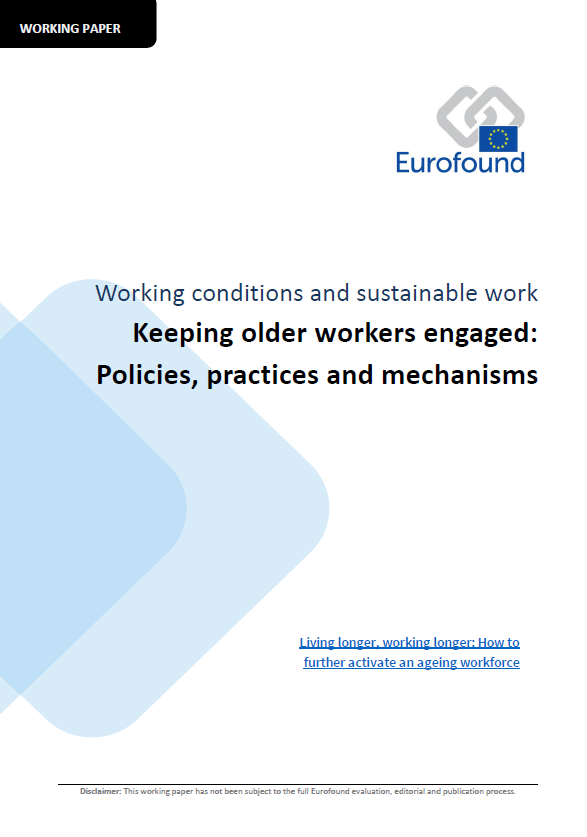EU context
Unatoč znatnom rastu stope zaposlenosti starijih radnika tijekom proteklog desetljeća u mnogim zemljama EU-a, Zajedničko izvješće o zapošljavanju Europske komisije za 2017. ističe potencijal dodatnog povećanja tih stopa. Stopa zaposlenosti starijih radnika u dobi od 55 do 64 godine 2016. u EU-u je iznosila 55,3 %, u usporedbi sa stopom od 66,6 % zaposlenih osoba u dobi od 15 do 64 godine u cjelini. Porast je bio najveći među starijim ženama.
Europski stup socijalnih prava pruža okvir za pomaganje tržištima rada u prilagodbi novim izazovima uz istodobno promicanje pravednosti i solidarnosti među generacijama. Naglašava pravo na radno okruženje prilagođeno profesionalnim potrebama radnika kako bi im se omogućilo produljenje sudjelovanja na tržištu rada. Osim toga, nedavni autonomni sporazum europskih socijalnih partnera o aktivnom starenju i međugeneracijskom pristupu obvezuje se na olakšavanje aktivnog sudjelovanja starijim radnicima i time omogućavanje dužeg ostanka na tržištu rada.
Rad Eurofounda
Eurofound je već dugo stručni autoritet u pogledu problema s kojima se suočava starija radna snaga. Istraživanja su od 1990.-ih bila usmjerena na sudjelovanje na tržištu rada, učinkovitost na radnom mjestu, radne uvjete i preferencije u pogledu rada starijih radnika u kontekstu politike promjenjivog demografskog profila Europe. Eurofound se usredotočio na potporu javnosti i na inicijative na razini poduzeća za poticanje zapošljavanja starijih radnika. Promatrao je starije radnice, ističući sve veće stope zaposlenosti ove skupine i njihov rastući udio u radnoj snazi, posebno u dobnoj skupini od 55 do 64 godine.
Rezultati istraživanja
Eurofoundova opsežna istraživanja pružaju niz podataka o situacijama starijih radnika. Šesto Europsko istraživanje o radnim uvjetima (EWCS) uspoređuje starije radnike u različitim dimenzijama kvalitete posla. Iako je manje vjerojatno da će stariji radnici ostati bez posla u odnosu na mlađe radnike, podaci pokazuju da stariji radnici smatraju da ako postanu nezaposleni, neće dobiti slično plaćen novi posao te da će imati poteškoće u ponovnom ulasku na tržište rada.
Istraživanje utemeljeno na Eurofoundovu petom Europskom istraživanju o radnim uvjetima (EWCS) razmatra obilježja starije radne snage i rada u različitim životnim razdobljima, kao i čimbenike koji čine posao održivim za radnu snagu koja stari: dobre radne uvjete, fizičku i psihičku dobrobit i ravnotežu između poslovnog i privatnog života.
Eurofoundovo Europsko istraživanje o kvaliteti života (EQLS) pruža rezultate o različitim dimenzijama kvalitete života u Europi prema dobi. Analiza preferencija u pogledu rada nakon 50. godine života oslanja se na treće Europsko istraživanje o kvaliteti života i pokazuje da mnogi stariji radnici radije rade manji broj sati čak i nakon što se uzmu u obzir njihove financijske potrebe. Olakšavanje boljeg usklađivanja radnog vremena s preferencijama radnika može omogućiti ljudima da rade dulje i motivirati ih.
Produljenje radnog vijeka
Eurofound se nedavno pridružio još trima agencijama Europske unije radi proučavanja radnih mjesta u Europi prilagođenih starijim dobnim skupinama, izazova politika povezanih sa starenjem radne snage i inovativnih rješenja.
Mnogi radnici nisu u mogućnosti raditi ili nisu motivirani da rade do zakonske dobi za umirovljenje. Međutim, postoji i skupina koja je sposobna i voljna raditi i nakon nje. Eurofound istražuje sve češću pojavu rada nakon umirovljenja.
Nedavna istraživanja usredotočila su se na produljenje radnog vijeka putem fleksibilnih sustava umirovljenja, posebno sustava djelomičnog umirovljenja koji to mogu olakšati. Pregledi karijere na polovini radnog vijeka isto tako mogu pridonijeti produljenju radnog vijeka. U istraživanjima se analiziralo na koji način takvi pregledi mogu pomoći radnicima u razmatranju mogućnosti za ostajanje na radnom mjestu do što kasnije dobi za umirovljenje. Ističu se različiti instrumenti koje su poduzeća razvila kako bi zadržala starije radnike.
U ostalim istraživanjima dokumentirane su nacionalne i sektorske inicijative vlada i socijalnih partnera za zadržavanje starijih radnika na tržištu rada, uključujući financijske poticaje i poboljšane uvjete. U ranijem projektu analizirane su inicijative za upravljanje pitanjem starenja uvedene prije i nakon recesije kako bi se istaknule dobre prakse u poduzećima u Europi.
Izvori
















